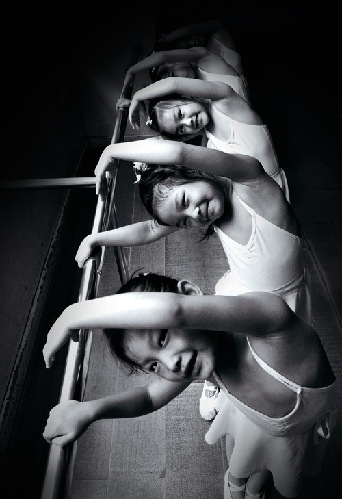|
 |
|
BIG STRETCH: Young girls take extra-curricular dance class in Nanchang, Jiangxi Province XIONG JIAFU |
Li Tianyi is a busy seven-year-old. Besides her normal school work, she has to learn English, piano, Chinese calligraphy, painting and the International Mathematical Olympiads on Saturdays and Sundays. In summer and winter holidays she has no time to rest as her schedule demands still more extra classes.
"Frankly, I like painting, but I don't like the International Mathematical Olympiads class," said the first grader at Erligou Primary School in Beijing's Xicheng District.
"But mum told me that this class can help me be admitted by a better middle school. I think it's too much for me."
However Wang Rong, the girl's mother, doesn't see it that way. "In her [Li's] class, there are a lot of other students who are attending more classes than her," Wang told ChinAfrica. "I know she is not happy with all these after-school classes because she has less time to play. And also, I don't want to force her to do that. But I have no choice. I have only one child and I don't want her to be less competitive than her classmates from the very beginning."
In fact, it is not just a competition for the children, but also for all the families that have children in school in China. Wang doesn't have a rich family. With a monthly income of about 6,000 yuan ($953) for the family, she needs to spend over 1,000 yuan ($159) on her daughter's after-school lessons.
Wang says the cost is not a burden for her as she believes the more the girl learns, the more opportunities she will have in the future. Wang's determination to give Li the best education knows no bounds. Last year, when it was time for Li to go to primary school, she refused to enroll her in a nearby school in Fengtai District, where she did not need to pay any tuition fee, and instead registered Li at a primary school in Xicheng District, with fees of 50,000 yuan ($7,937).
"I know that the schools in Xicheng are much better than those in Fengtai," said Wang.
Family burden?
Such an ideology of raising children seems to be very commonplace in China, especially in big cities like Beijing, Shanghai and Guangzhou. A recent Internet post attracted much attention from many Chinese mothers. In the post, a mother calculated the cost of raising a baby to 22 years old when he or she graduates from the university. Her calculations came close to 480,000 yuan ($76,190).
"I don't think such result is overstated," Liu Xiuying, President of the Institute of Family Education of China Youth and Children Research Center (CYCRC) told ChinAfrica, adding that the figure is likely much higher for some families.
In mid-2011, Liu's institute launched a survey in eight major cities in China such as Beijing, Harbin, Nanjing and Guangzhou on the expenditures of families with children from the first grade of primary school to the third grade of junior middle school. Results show that on average, an urban family spends 30.1 percent of its total income on their children's education.
"Children's costs have become the major part of a family's expenditure," said Liu.
During the nine-year compulsory education from the first grade of primary school to the third grade of junior middle school, a family does not need to pay any tuition fee for regular school education. Thus, most of the expenditures are used on after-school lessons.
A recent survey conducted by the All-China Women's Federation shows that children's education fees, low family income and medical bills are the three major challenges for families in cities. Since the mid-1990s, average family expenditure on education has increased at an annual rate of 29.3 percent, much higher than the average growth of family income, and China's GDP growth.
|